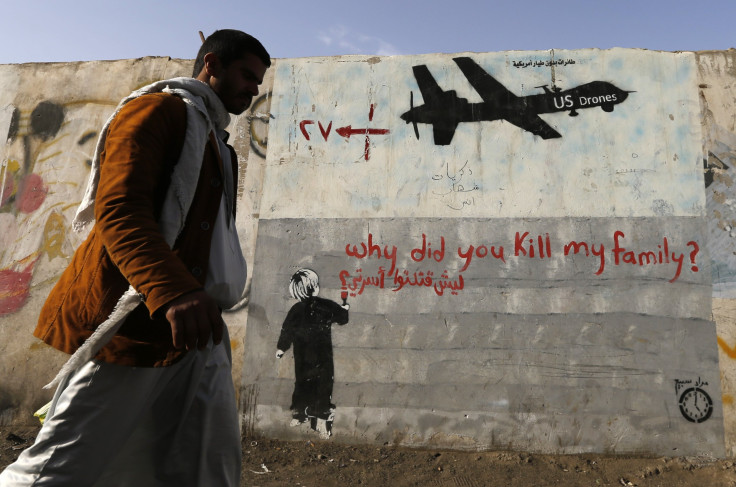Snowden Documents Suggest UK Intelligence Support For US Drone Strikes In Yemen

New details of a drone strike in Yemen, conducted under the United States' targeted killing program in the country, reveal the scope of U.K. intelligence involvement, leading to calls for transparency in the operations of Britain’s top spy agency.
The documents, which were only recently disclosed, were provided by National Security Agency whistleblower Edward Snowden, and discuss how a drone strike in Yemen in 2012 was supported by a joint program between the U.S., U.K. and Australia, codenamed "Overhead," according to reports from the New York Times and the Guardian.
Britain has so far only carried out its own drone strikes in war zones in Libya, Iraq and Afghanistan, but Wednesday’s leaks raise questions about the role that British intelligence played in coordinating drone strikes outside of war zones.
A leaked memo from the U.K. Government Communications Headquarters (GCHQ) detailed how Yemen had become a surveillance priority for the Overhead program in 2010. GCHQ said that the NSA’s focus on Yemen was a “great opportunity” for U.K. intelligence services to focus on any leads they had in the country.
The decision to make Yemen an Overhead priority reportedly came shortly after two foiled terrorist attempts -- the 2009 Christmas day bomb plot where a man attempted to detonate explosives hidden in his underwear during a transatlantic flight, and a 2010 conspiracy to smuggle explosives hidden in printer cartridges onto planes. Both attacks were revealed to be the work of al Qaeda in the Arabian Peninsula (AQAP), considered the most powerful affiliate of the international terror group.
The GCHQ documents also reportedly suggest that it provided intelligence for a strike on Khadim Usamah in Yemen in 2012 that killed Usamah and another unidentified person. Usamah was identified in the documents as an AQAP member and described as “the doctor who pioneered using surgically planted explosives,” suggesting that he was working on methods to sneak suicide bombers past airport security.
The Guardian reported that a U.K. barrister who reviewed the documents said the revelations raise fresh concerns about the GCHQ’s role in global drone strikes. “Assuming that the documents which I have seen are genuine, in my view they raise questions about the extent to which UK officials may have had knowledge of, or helped to facilitate, certain U.S. drone strikes which were not carried out in the context of an international armed conflict,” Jemima Stratford told the Guardian. “These documents underline why greater transparency as to U.K. official policies would help to ensure legality from a domestic and international law perspective.”
U.S. officials reportedly confirmed that there had been one drone strike in Yemen on March 30, 2012. A database of drone strikes maintained by the London-based Bureau of Investigative Journalism found that the strike on that date caused between six and nine civilian casualties, including children.
The GCHQ documents also suggest that the U.K. is working to expand its location-tracking capabilities to Pakistan, where a majority of drone strikes have taken place, in order to support military operations.
Another leaked document from 2009 indicates that the GCHQ accepted the U.S. definition of a combat zone, which allows the deployment of drone strikes and military operations outside conventional war zones. It referred to the British agency’s ability to provide “tactical and strategic SIGINT [signals intelligence] support to military operations in-theatre, notably Iraq and Afghanistan, but increasingly Pakistan.”
Both GCHQ and the NSA reportedly declined to comment. A U.K. government spokesman told the Guardian: “It is the longstanding policy of successive U.K. governments not to comment on intelligence operations. We expect all states concerned to act in accordance with international law and take all feasible precautions to avoid civilian casualties when conducting any form of military or counter-terrorist operations.”
© Copyright IBTimes 2024. All rights reserved.




















